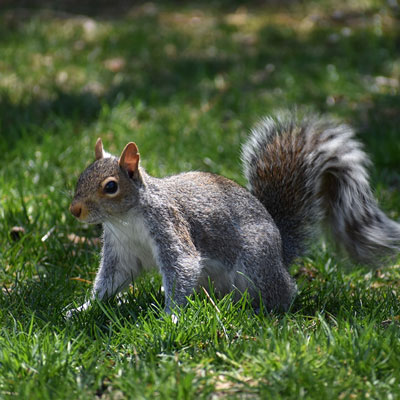Squirrel Diseases | Dangers Of Having Squirrels In Your Attic
If you think that the noises you’re hearing are annoying, they aren’t even the worst of your worries when it comes to having a squirrel family in your home. Having any wild animal in your home has the potential to cause risks, however squirrels come with their set of risks.
While squirrels can fit into tiny holes to gain access into your home, they can also chew holes into the home to create an access. They are known for chewing holes under the eaves in order to create a way into your attic.
Since they have rodent-like teeth, squirrels also will gnaw on pretty much anything they can get their paws on. One of the things they love to gnaw on is electrical wiring, which sounds terrible. When they chew through wiring and leave it exposed, this is a huge issue as there is now potential for a fire to break out. They also love to chew on insulation, which not only can harm them but if they damage enough of the insulation, you would have to end up getting it completely replaced. Squirrels also love to gnaw on wood, this includes the wooden beams up in your attic. They aren’t known for being able to read blueprints, so it is a common issue that they gnaw through the wrong board and potentially cause damage to the roof.

Aside from the dangers of having them inside, when they leave the attic to forage for food they can rip up any gardens you may have and destroy your landscaping. If they have been in the attic for a while they more than likely view your home as their own, so they feel comfortable digging up the yard looking for food.
Clearly, with all of these risks to your home, you don’t want to let a squirrel go on living in your home for very long. Especially because the more squirrels you have chewing on things, the bigger the problem can get.
As with any animal, there are some health risks involved with squirrels living in the home. However, there are not AS many as associated with other types of animals. It was once commonly thought that you can catch rabies from squirrels, while it is technically possible, it is not a common issue at all. In fact it’s so rare that you would be hard-pressed to find any good evidence saying that squirrels pass rabies to humans. For whatever reason, squirrels do not catch the rabies virus very often and they are not known for being carriers of it either.

One of the more common risks that squirrels can bring into your home are fleas and ticks. Even if you don’t own any pets, these little bugs can be terrible to have in your home. Flea infestations are terrible -and itchy- and are not the easiest to get rid of! These almost invisible bugs can live on your pet, carpet, bedding, and other furniture. Ticks are also difficult to deal with. If you’ve ever lived in the country you probably are used to checking for ticks, and you also know how annoying they can be. These little bugs attach themselves to you and feed off your blood, you have to pull the entire bug off-typically with tweezers- without leaving the head in. Ticks are well known for being carriers of several diseases, so rather it’s one tick or twenty, you don’t want these bugs crawling around your home.
If you let a squirrel stay for too long, their feces- or poop- will end up piling up (no pun intended). This can be a health issue and poses the threat of salmonella and leptospirosis. This is only in extreme cases but is a very real risk if the problem goes on for too long.